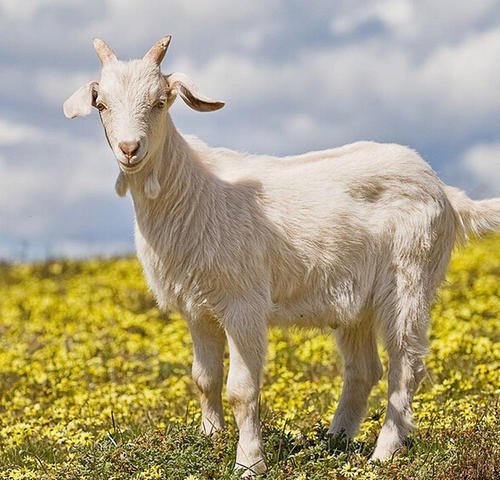Now, Words and Their Stories, a program from VOA Learning English.
On this program, we take English expressions and explain where they came from and how to use them.
In all languages, animals often find themselves in the center of many common expressions. English is no different. Today we focus on the goat!
People have been dealing with goats for a long time. A website on the history of goats, The Goat Guide, says their story dates back many centuries. It claims that people began using the animals as food over 9,000 years ago!
Goats are nosy, social animals. They are strong and can live in any number of environments. They can eat almost anything and a lot of it!

Among all domesticated animals, goats probably have the most going for them. Milk from goats never costs a lot. And goat milk is easy for the body to digest. Their meat is tasty and can be prepared in different ways. In addition, goat hair is used to make some of the finest and softest clothing money can buy.
With such a long history and so much going for goats, you would think that English has many expressions with the word goat.
But it doesn't.
We only found two. And one is just a noun: the word goatee.
Now, goats have small, tufts of hair on the lower part of the face. So a goatee is facial hair in about the same part of the chin on a man. It looks a little like the beard on a male goat.
The Merriam-Webster Dictionary claims that the word goatee first appeared in 1841. At that time, a goatee only meant hair growing on a man's chin, much like a goat's. However, by the 1990s, the word had come to mean any facial hair that is on the chin but not higher up on the cheeks. So it also involved men wearing a mustache. Some would argue -- and people who study men's facial hair do -- that a true goatee is only hair on the chin.
The next goat-related expression is more interesting -- to get someone's goat.
Hearing this expression the first time, you might think it means to steal someone's goat. But that is wrong.
If someone gets your goat, they make you angry.
But why?
That's a good question. The answer is ... we're not so sure.
A Dictionary of Slang and Unconventional English says that "to get someone's goat" may come from the French expression prendre la chevre, which means to take the goat.
Apparently, one way people could get milk was from a goat. So naturally, taking the animal would anger its owner.
Another explanation has to do with horseracing.
In the 1900s, people who trained horses were said to have put goats near racehorses to keep them calm. Just before the race, the goat was removed. This would, supposedly, make the horse nervous and ready to run.
However, there is no evidence to support this explanation. People who study languages for a living have a name for it -- folk etymology. Another term for it is an urban legend.
In earlier times, "to get your goat" had another meaning. If something got your goat, it could have made you nervous or worried.
In his book Smoke Bellow, American writer Jack London tells the story of two men crossing a bridge that is very high off the ground. The lead character, Smoke, makes it safely across and shouts a warning back to the other.
"Your turn," he called across. "But just keep a-coming and don't look down. That's what got my goat. Just keep a-coming, that's all. And get a move on. It's almighty rotten."
Here, he means looking down made him feel frightened. Americans don't really use the expression in this way any longer. It is a good example of how the meaning of an expression can change over time.
Let's talk about some other words that mean the same as "got someone's goat."
We have already used the word "annoy." Some similar words are aggravate, bother and bug. You can also irk and vex someone. So, something that gets your goat is irksome or vexing. And if someone has gotten your goat, you could also say he or she has rubbed you the wrong way.
With all of these expressions, it can be an action that gets your goat or a person who gets your goat.
Let's say you work with someone who doesn't clean up after herself. You can say, she really gets your goat. Or if you want to make it less personal, you can say, "It really gets my goat when she makes a mess at the coffee machine."
Now, if something often gets your goat or rubs you the wrong way, it can become a pet peeve. Pet peeves are those seemingly small things that get on your nerves.
While a person can get your goat or get on your nerves, he or she cannot be called a "pet peeve." But their actions can!
For example, one pet peeve of mine is when one person takes up two seats on a crowded train, especially if a pregnant woman or older adult needs a seat! Is it a big deal? No. But it gets my goat, nonetheless.
And that brings us to the end of this Words and Their Stories.
So, what gets your goat? What rubs you the wrong way? Do you have any pet peeves? Let us know in the Comments Section!
I'm Bryan Lynn.
And I'm Anna Matteo.












